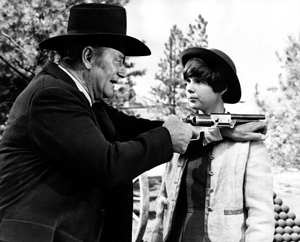It would seem that the two most widely discussed films this summer are both going to be Westerns, The Wild Bunch and True Grit. "Widely" is the operative word because the Western is one kind of film that can cut across the boundaries of today's compartmentalized movie-going public, even though most observers were becoming convinced that the genre was permanently running down a hill and out of vitality and conviction.
Whatever else they may be, the two films are a stunning reaffirmation of the Western's resilience. Though The Wild Bunch has its vociferous supporters, it has also outraged critics who think, as I do myself, that it is just the wrong picture at the wrong time and that, whatever its intentions, any purported constructive impact is obliterated in a sea of blood. The subject it raises in extreme form, however--the interrelationship in all its aspects between violence in real life and the dramatic depiction of violence--is despereately in need of sensible discussion (and here the operative word is "sensible.") I will revise my opinion of the film if it actually serves to get that discussion going, and it just might in conjunction with True Grit, which appears to be just the right film at the right time, both artistically and commercially.
I have reservations about this film which, as far as I can make out, are not widely shared. Charles Portis' novel, on which it is based, was the first person narrative of a spunky 14-year old girl (Kim Darby) who, with the reluctant aid of a U.S. Marshal (John Wayne) and a Texas Ranger (Glen Campbell), pursused her father's murderer into Indian territory. The girl's subjective viewpoint, a unique 19th century blend of rigid, pious sentiments and matter-of-fact cold-bloodedness, served to unify the sanguinary, melodaramartic but, on occasion, irrepressibly comic sequence of events that was being narrated. Marguerite Robin's screenplay switches to an objective viewpoint, placing central emphasis on the John Wayne character. In the process, it seemed to me, both the melodrama and the grim comedy tended to get out of control in a sensibility-assaulting way.
Be that as it may, the film is an undeniably vivid, exceedingly well directed (by veteran Henry hathaway) frontier tale that "tells it like it was." The brutality, callousness, individualistic instinct for self-preservation are there because they have to be, and we cannot help being relieved that life, for most of us, no longer imposes such cruel options. But a sense of our common humanity is there, too, and we can also ponder on what we have lost. The point is that True Grit, unlike The Wild Bunch and a distressing number of other recent films, allows its story to speak for itself without self-righteous editorial comment. As a result it is apparently going to be seen and enjoyed by vast numbers of people, which after all is one ingredient without which no film communication is possible.








